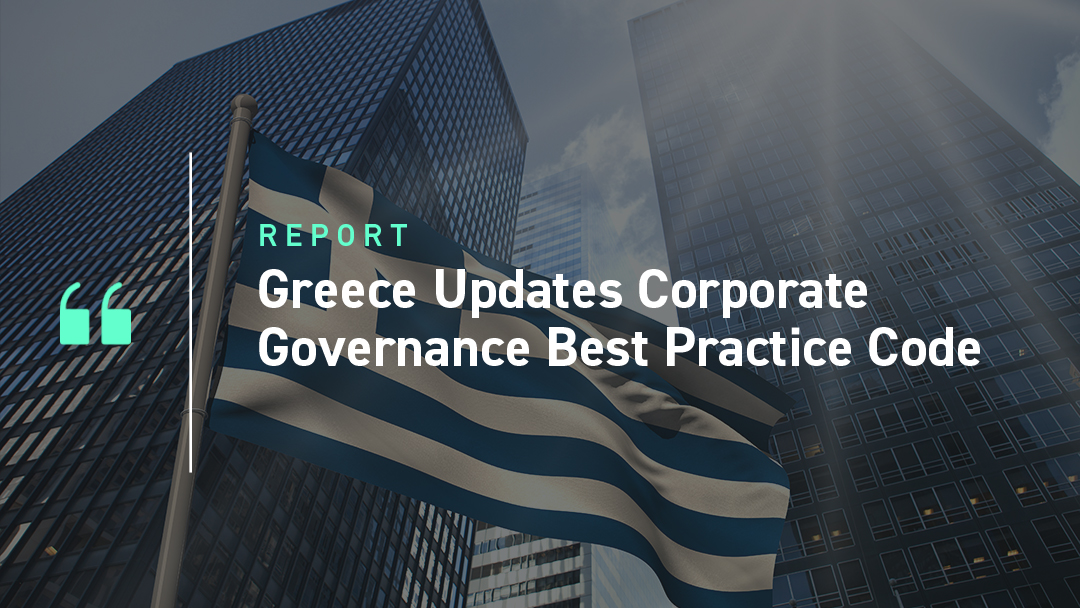In June 2021, the Hellenic Corporate Governance Council (HCGC) issued the 2021 Hellenic Corporate Governance Code (the “Code”) for Greek companies with securities listed on a regulated market operating in Greece and for Greek companies with securities negotiated in a Multilateral Trading Facility (e.g. the Alternative Market of the Athens Exchange) that opt to be subject to Law 4706/2020. The Code, which replaces the 2013 version and entered into force on July 17, 2021, develops Special Practices and Recommendations beyond the provisions of Law 4706/2020 (see also Greece Updates Corporate Governance Regulations) and the guidelines of the Hellenic Capital Market Commission on the directors’ suitability policy. Special Practices are subject to the ‘comply-or-explain’ principle whereas non-compliance with Recommendations need not be explained.
The Special Practices deal with many issues related to board and committee composition, director remuneration, and sustainability. Regarding the board, the Special Practices provide, among others, that the non-executive directors shall not participate in more than five boards of listed companies, and in the case of the chairman, in more than three.The board chairman should be independent, and if not, one of the independent non-executive board members should be appointed either as vice-chair or as a senior independent director. If the chairman is an executive, the independent vice-chair or the senior independent director does not replace the former in his/her executive duties.
Concerning the committees, the Special Practices indicate that for separate remuneration and nomination committees, the chairman of the nomination committee may not chair the remuneration committee. For a remuneration committee member to be appointed as the committee chairman, s/he shall have served the committee for at least one year (this is not the case if the committee has not been established or operated in the previous year). Moreover, if the board chairman is a member of the remuneration committee, s/he cannot take part in the determination of his/her remuneration.The term of office of the members of the remuneration and nomination committees shall coincide with the term of office of the board and not exceed nine years in total.
In terms of executive remuneration, the Special Practices state that the maturity of granted stock options is for a period of at least three years from the grant date, and provide for clawback clauses. Regarding the clawback, the board may require the refund of all or part of the bonus awarded to executives due to breach of their contractual terms, or due to incorrect financial statements and financial data used for the bonus calculation. Finally, in terms of NED remuneration, the additional remuneration of the board members sitting on committees shall be clearly disclosed in the remuneration report and at their approval by the general meeting.
Based on the Special Practices,companies should adopt and implement a policy on ESG and sustainable development (Sustainability Policy).Companies should also make available to shareholders and other stakeholders publications on the management and performance of sustainable development (ESG) issues.[1]
Aligned with the Special Practices, the Recommendations also regulate several matters including board composition, remuneration and shareholder engagement. Specifically, they recommend that the independent non-executive members shall not be less than half of the total number of board members. With regards to remuneration, they point out that the board examines and links the executives’ remuneration with indicators on ESG issues and sustainable development. These indicators shall be relevant and credible and promote the efficient management of ESG issues and sustainable development. Regarding shareholder engagement, companies shall implement procedures for the submission of requests and concerns by shareholders. These requests should be addressed by the company through public replies and within a specified time frame. Lastly, a legal provision of interest that is also quoted by the Code is that a non-executive director is considered non-independent if s/he has been a board member of the company, or of a related
[1] Based on the Recommendations of the Code, the indicators to be used by the companies to make this information public, shall be of internationally recognized initiatives, such as the GRI, the SASB organization, the CDP, the UNGC, and the ESG 2019 Reporting Guide of the Athens Stock Exchange.
By Ioannis Vamvakas, Associate, Southern European Research



